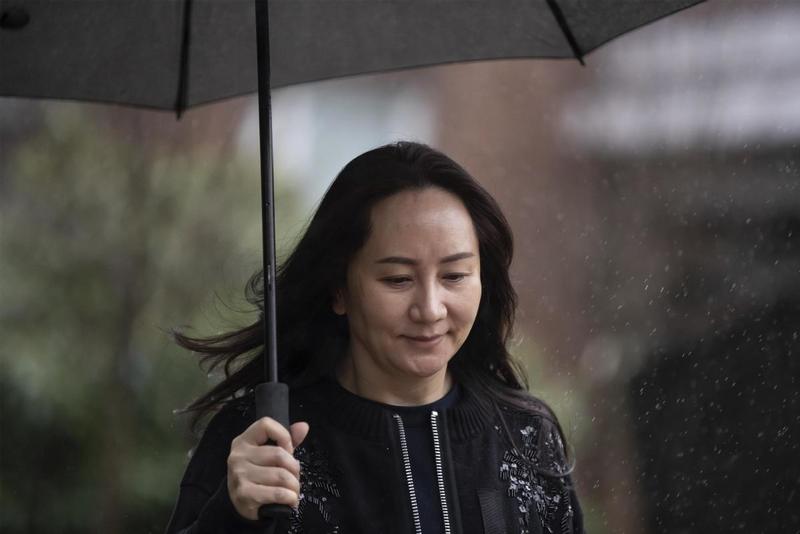 Huawei Chief Financial Officer Meng Wanzhou leaves her home to attend a hearing in Vancouver on Nov 24, 2020. (DARRYL DYCK / THE CANADIAN PRESS / AP)
Huawei Chief Financial Officer Meng Wanzhou leaves her home to attend a hearing in Vancouver on Nov 24, 2020. (DARRYL DYCK / THE CANADIAN PRESS / AP)
Lawyers for Huawei Chief Financial Officer Meng Wanzhou are pressing their case that her 2018 arrest in Canada resulted from a conspiracy between authorities in Canada and the United States.
A Canadian police officer who seized Meng's electronic devices during the arrest has denied giving information to the FBI.
Meng was first detained by the Canada Border Services Agency, or CBSA, and interrogated for nearly three hours during which time border agents seized the devices and secured the pass codes.
Huawei's lawyers have alleged that during Meng Wanzhou's arrest at Vancouver airport, US and Canadian authorities coordinated to use the Canada Border Services Agency's additional investigative powers to interrogate her without a lawyer present, before Canadian police arrested Meng on a warrant from the US charging her with bank fraud
Huawei's lawyers have alleged that during Meng's arrest at Vancouver airport, US and Canadian authorities coordinated to use the CBSA's additional investigative powers to interrogate her without a lawyer present, before Canadian police arrested Meng on a warrant from the US charging her with bank fraud.
ALSO READ: Conspiracy claimed in Canada arrest
Both Huawei and Meng, 48, deny the US accusation. Her lawyers allege her civil rights were violated during the interrogation and arrest and are trying to get her extradition thrown out.
Royal Canadian Mounted Police, or RCMP, Sergeant Janice Vander Graaf testified on Tuesday in Vancouver that she had concerns about the suggestion from her superior that Meng be apprehended on the plane. Even though the RCMP was legally entitled to do so, Vander Graaf said she believed it would be "overstepping authority".
"I didn't think there was an emergency situation that necessitated the RCMP going on to the plane," she told the British Columbia Supreme Court.
Alleged illegal coordination
Despite her reservations, Vander Graaf said she passed on the suggestion to RCMP Constable Gurvinder Dhaliwal the day before Meng's arrest.
CBSA and RCMP officers have been called to testify specifically on the alleged illegal coordination between the forces and whether identifying details about Meng's devices were purposely shared with police and US authorities.
Dhaliwal told the court on Tuesday that he did not recall a separate conversation with Vander Graaf in which he told her that sensitive information about those devices was sent to US authorities.
READ MORE: Conflict of evidence at hearing of Huawei's Meng Wanzhou
Defense lawyer Scott Fenton confronted Dhaliwal about a note made by his supervisor. He said the note suggested that Dhaliwal knew that Staff Sergeant Ben Chang, one of his colleagues, had sent the serial numbers and SIM card numbers of Meng's devices to the FBI ahead of a request for evidence.
Chang, who has since retired from the RCMP, has refused to testify. Court documents show government prosecutors declined to share notes relating to him due to concerns about witness safety.
Meng's lawyers have argued that the FBI conspired with the CBSA and the Canadian federal police at the time of her arrest to mount a "covert criminal investigation".
Earlier on Tuesday, Fenton asked Dhaliwal if he knew Meng was "subject to some FBI surveillance".
Dhaliwal replied that it appears someone did know, based on records and exhibits.
Witness testimony is set to last until Friday.
Agencies and Rena Li in Toronto contributed to this story.


